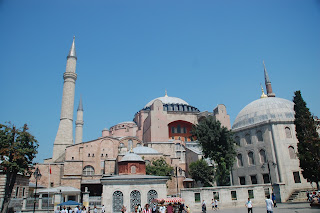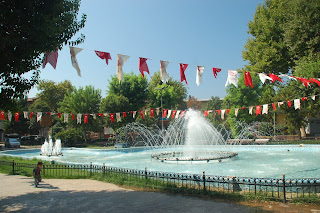Iran - topic: I just would like to highlight some topics about Iran how we saw it. These are just our experiences, it doesn't necessarily mean that it will happen to everyone in the same ways.
City story: I just mention our route and what kind of beauties we saw on the way.
This entry is about the lovely iranian people in general.
Welcoming
"Mister, how are you?" "Hello" "Welcome to Iran, welcome to my city" - countless times. Sometimes it's just a welcoming, sometimes they want to speak with you a bit, maybe they want to make a selfie with you. Still not so many foreign tourist visits their country, so they are deeply honoured to see one and talk to them. For example this man insisted on taking a photo with him, but we didn't even speak a word :)
Curiosity - You cannot imagine how curious they are. The topics they are most interested in:
- where are you coming from
- marital status and your family in general
- how do you like their country, what did you like the most,
- if they can help you somehow
- what is the general oppinion about Iran in your country
- how things work in your country and how much is your salary :)
Hospitality - They want to help you all the time. While travelling with a night bus from Tehran to Kashan a young couple invited to their home to have some rest in daytime and the guy will show us the centre in the afternoon. To top this: they didn't speak english, not a word, so finally I could use my english-farsi translator. Tourists are highly respected in this country.
Invitations - I could hardly count how many times were we invited to tea, breakfast, lunch or dinner. Every of them is totally unexpected: you are in a juice selling shop, and the owner don't want to let you out until you have breakfast with them. Or you are having a rest in a museum and two university student guys invites you to one of his home to have lunch with his family.
Wandering in Tabriz bazaar and asking carpet sellers where can you buy water and they are inviting you to their shop to have tea with them while they bringing you free cold water. In Esfahan one night we ordered two falafel sandwiches to take it to Khaju Bridge and listen to the singing people, and the owner guy didn't let us pay: "for you it's free, my friend". But you have to pay attention to this custom, because it's common in Iran and called ta'arof. You have to refuse these offers at least three times, and if the bidder is still insisting on their offer, you can accept. On another day we were just walking to the bus station with our big backpacks, and a man who was on his way to his workplace invited us to his office to have a tea with him. Cases like this really happens to you 4-5 times a day.
Fashion
Make up, make up, make up. Even on some trendy boys :) But for girls it is necessary. Our theory is that they have only their face uncovered and they want it to look like "perfect". Women have to wear hijab all the time. In bigger cities women usually dress more liberal way like these "powerpuff girls" (please note the selfie-making woman next to them!), but women who are very religious are wearing black chador all the time, in 40 °C also...
For men the only obligation regarding to dress code is long trousers. Men usually are wearing casual clothes, even if they go for some jogging or doing workout in the park.
Plastic surgery is connected to this topic.
Most popular types are lips and nose. It's a phenomenon among young women, but I've seen two guys also. I think in these countries this is caused by media, and it seems they have did it well: somehow they changed the concept of ideal of beauty and that's why lots of women feels now they have to do this surgery to find husband easier or to be accepted better by their husband. I don't know the reasons just guessing...
Musicality
We are live music lovers and we thought Iran will be a paradise for us and we can listen to eastern music everywhere: teahouses, on the streets, live concert halls. Well, no... Iranians really like traditional persian music, you can here it everywhere, but to catch it live it's a really hard quest. It is kind of "illegal" there to have fun, make music in bigger community, unless it is not connected to religious rituals, happenings. We asked local people: in older times they had live events not just in teheran, but in bigger cities also like Shiraz, Kashan. But nowadays it's only possible to attend events like this in Teheran. In other places it's only possible in bigger hotels and fancy restaurants, but in our oppinion it is not the most authentic way, so we didn't check these opportunities. Our only and most meomrable moments were while we where listening to local singers under Khaju Bridge in Esfahan. It is something really special and absolutely amazing. Suddenly you realise that here are these hidden gems with this musical knowledge and it's hard for them to find opportunites to get in contact with their audience. People come, listen to the lovely music, and if the crowd becomes big, police come. People go away. A singer starts again, people come and the game continues like yin and yang.
Working
I had a feeling that lots of people are just sitting in a shop as a seller because they don't have better things to do and they want to spend time. I am going to write a seperate blog entry about just shopping and shops but a picture like this is very common while you are walking on the streets, in the bazaar. People in summer are exhausted, and in the middle of the day they often have long siesta, or even closing their shop. Between 12-15 hours it's better to find a cool shelter in a teahouse or in a garden for example, because life is practically stops in cities. As I saw the average active working times are starting aroung 8-9 o'clock and lasts until 12. In the afternoon life starts again around 15 o'clock and most of the shops are closing only at 22 o'clock. The situation is not better for people who are not sellers neither. We've met an aircraft engineer who works from 8-20, and with a driver in Teheran who worked 15 hours that day. If you want to have better life, one job is not enough here.
Military service
You can see lots of soldiers on the streets, on bus stations. Iranian men have 2-years military duty, and until they haven't served it, they are nnot allowed to go abroad. We've met a tour guide who managed to exchanged his active soldier duties with teaching in a school, so it is a flexible system as we saw it. Many of them - like this guy - have to serve in a mosque as a guard.








































